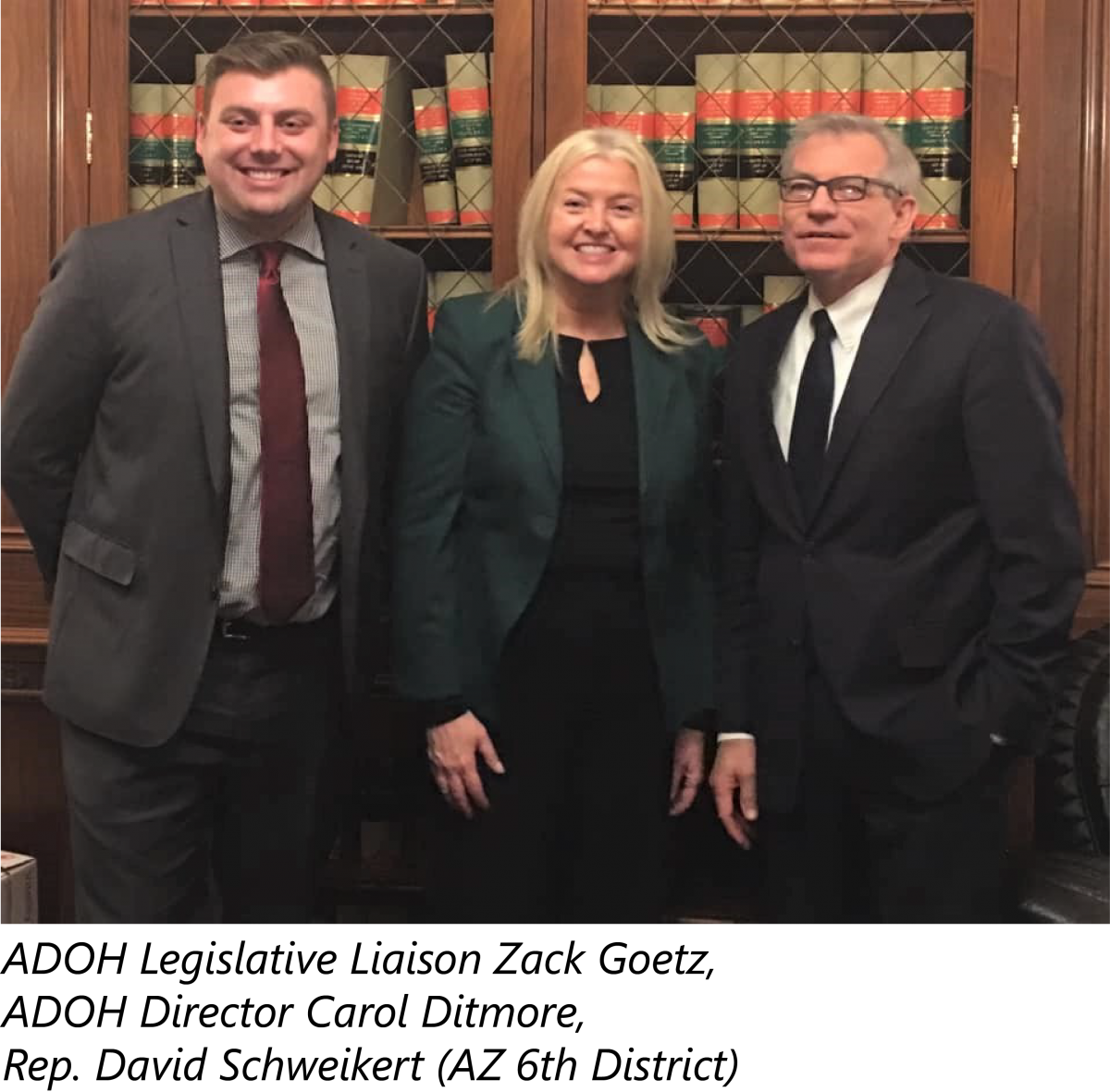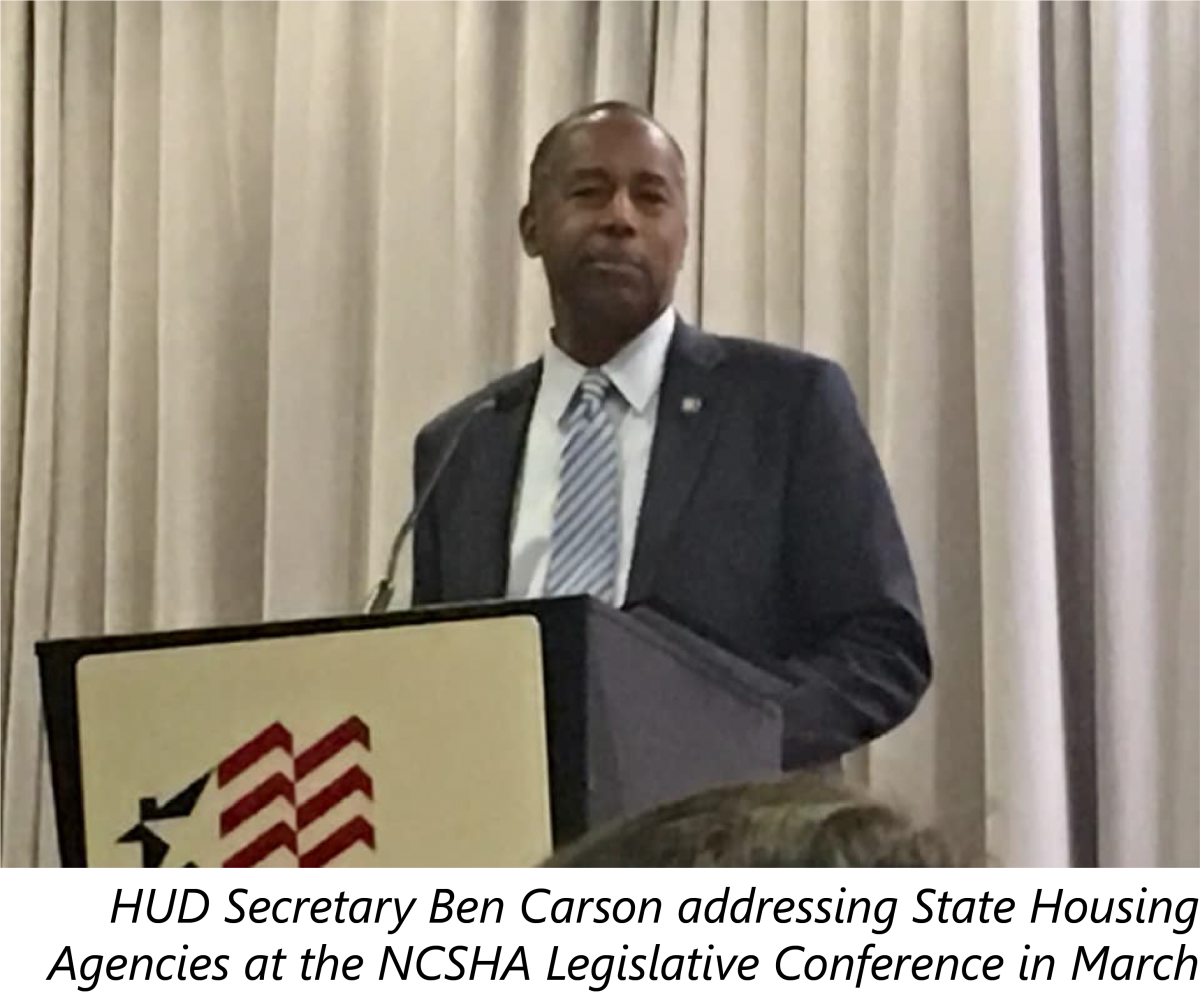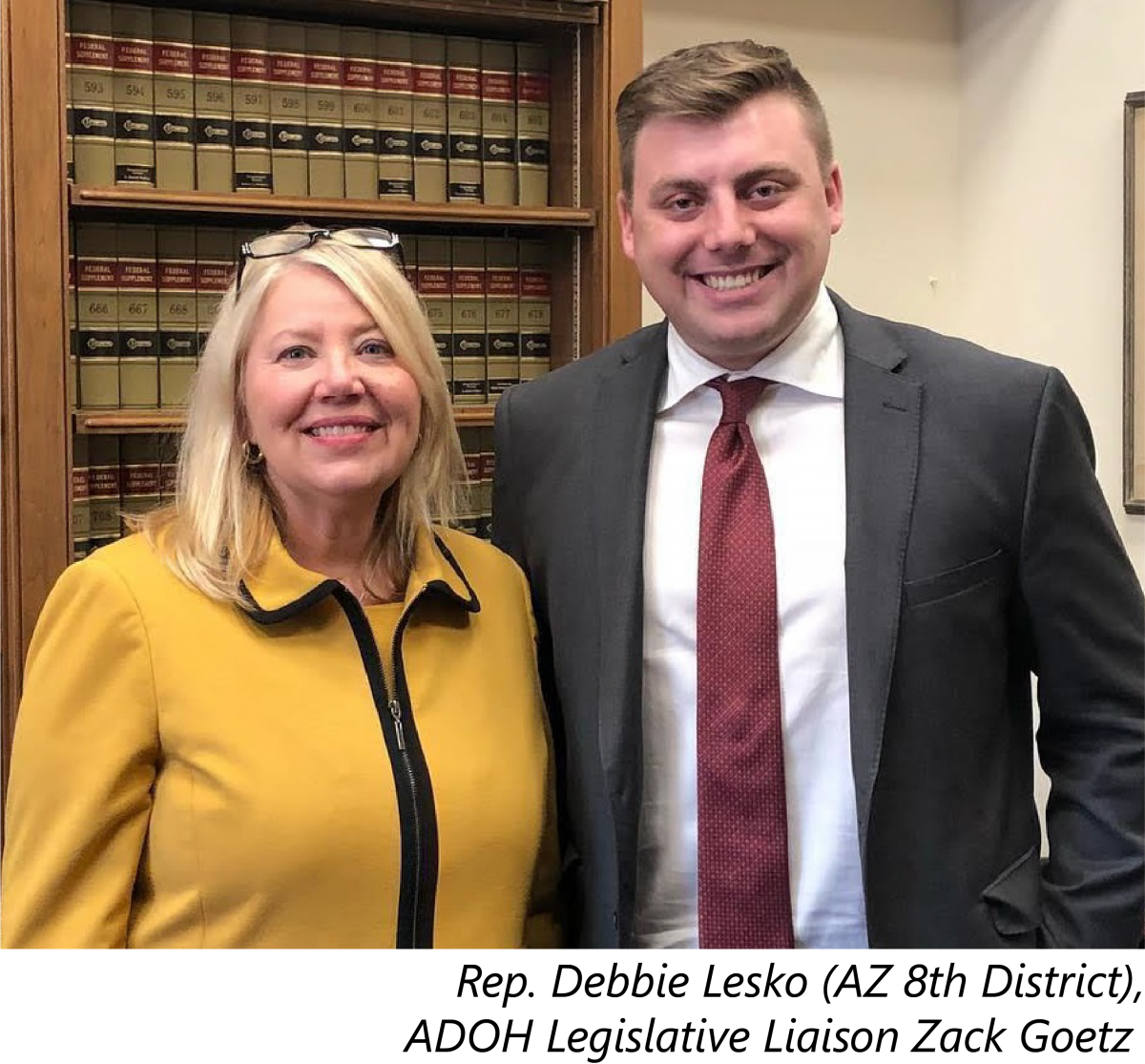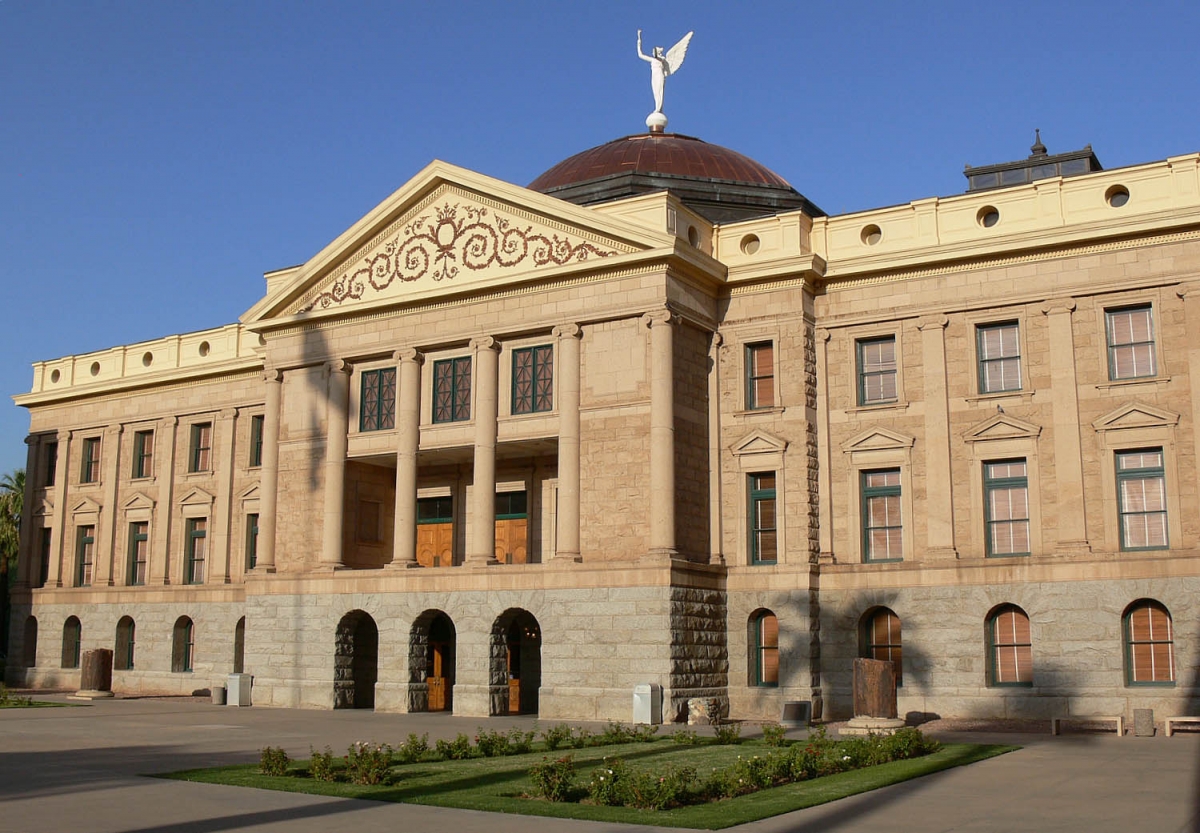Spring 2019 Legislative Update
 Arizona Department of Housing’s Director Carol Ditmore and Legislative Liaison Zack Goetz spent the week of March 11th in Washington, DC to attend the National Council of State Housing Agencies (NCSHA) 2019 Legislative Conference. Director Ditmore and Mr. Goetz discussed federal housing policy priorities with housing agencies and stakeholders from around the country, and also heard from U.S. Department of Housing and Urban Development (HUD) Secretary Ben Carson. Additionally, Director Ditmore and Mr. Goetz held meetings with the Arizona delegation to advocate for the aforementioned priorities, which included increasing the Federal Low Income Housing Tax Credit (LIHTC) resource and maintaining the Arizona Department of Housing as the Performance Based Contract Administrator (PBCA) for the state. There is not yet an active bill for LIHTC cap increase, but the Department is expecting one to drop soon.
Arizona Department of Housing’s Director Carol Ditmore and Legislative Liaison Zack Goetz spent the week of March 11th in Washington, DC to attend the National Council of State Housing Agencies (NCSHA) 2019 Legislative Conference. Director Ditmore and Mr. Goetz discussed federal housing policy priorities with housing agencies and stakeholders from around the country, and also heard from U.S. Department of Housing and Urban Development (HUD) Secretary Ben Carson. Additionally, Director Ditmore and Mr. Goetz held meetings with the Arizona delegation to advocate for the aforementioned priorities, which included increasing the Federal Low Income Housing Tax Credit (LIHTC) resource and maintaining the Arizona Department of Housing as the Performance Based Contract Administrator (PBCA) for the state. There is not yet an active bill for LIHTC cap increase, but the Department is expecting one to drop soon.
On February 1st, the U.S. Senate Banking, Housing, and Urban Affairs Committee Chair Mike Crapo (R-ID) unveiled an outline for housing finance reform legislation. His priorities for reform included: protecting taxpayers from risk, preserving the 30-year fixed-rate mortgage, increasing competition, and promoting access to affordable housing.
On March 26th and 27th, the U.S. Senate Banking, Housing, and Urban Affairs Committee held hearings on Senator Crapo’s previously released outline for reforming Fannie Mae and Freddie Mac, making them the first hearings on housing finance reform this Congress. Senator Crapo has pledged that the Committee will take up housing finance reform by 2020.
 Also on March 27th, President Trump issued an executive memorandum directing the U.S. Department of Treasury and HUD to develop housing finance reform plans, specifically ordering the Treasury to remove the government-sponsored enterprises Fannie Mae and Freddie Mac from conservatorship, making them mortgage guarantors in the private sector. HUD was directed to develop proposals for reforming the housing finance programs administered by the Federal Housing Administration and Ginnie Mae. Both the Treasury and HUD must determine whether their ideas for reform may be passed legislatively or if they can be enacted directly by the Administration.
Also on March 27th, President Trump issued an executive memorandum directing the U.S. Department of Treasury and HUD to develop housing finance reform plans, specifically ordering the Treasury to remove the government-sponsored enterprises Fannie Mae and Freddie Mac from conservatorship, making them mortgage guarantors in the private sector. HUD was directed to develop proposals for reforming the housing finance programs administered by the Federal Housing Administration and Ginnie Mae. Both the Treasury and HUD must determine whether their ideas for reform may be passed legislatively or if they can be enacted directly by the Administration.
For more in-depth information on these Federal housing issues, please follow the links below:
Chairman Crapo Releases Outline for Housing Finance Reform
President Directs Treasury and HUD to Develop Housing Finance Reform Plans
President Donald J. Trump Is Reforming the Housing Finance System to Help Americans Who Want to Buy a Home
Housing Matters | Spring 2019
 The 54th Legislature - 1st Regular Session is in its fourth month, and there have been 1,289 bills posted this session altogether, with 46 bills passed into law and one vetoed by Governor Ducey as of this posting. This year, there is a great deal of momentum for housing issues, which has led to substantial bipartisan legislation relevant to the Arizona Department of Housing and housing advocates.
The 54th Legislature - 1st Regular Session is in its fourth month, and there have been 1,289 bills posted this session altogether, with 46 bills passed into law and one vetoed by Governor Ducey as of this posting. This year, there is a great deal of momentum for housing issues, which has led to substantial bipartisan legislation relevant to the Arizona Department of Housing and housing advocates.
-
Two bills look to create a state tax credit for affordable housing: HB 2365 and HB 2736; they both have advanced past committee but would still need to get through the House, Senate, and Governor’s desk to become law.
-
Senate Bill 1300 expands on existing tax exemption statute for low-income housing, by modifying the requirements to qualify for tax exempt status.
-
SB 1098 seeks to establish the Housing Assistance Pilot Program and would also create a correlating housing assistance advisory board consisting of the directors of the Department of Housing, Corrections, Economic Security, and AHCCCS. $5 million would be appropriated to the board in FY19-20, with the board then awarding grants to be spent specifically on certain populations.
-
SB 1471 would supplement funding for those same purposes by creating a new funding source – tax collections on non-resident sales of real property located in Arizona. Of the tax collections, up to $10 million annually would be deposited to the Housing Trust Fund, with the requirement that the monies be spent on specific populations. Any additional tax collections beyond $10 million would be deposited to the state general fund.
As it currently stands, there are two bills relevant to manufactured housing that are still alive.
-
House Bill 2430 (Mobile homes; taxes) mandates that a person who owns a mobile home that is permanently affixed to real property shall (taking the place of “may”) file an affidavit of affixture with the county recorder of the county in which the real property is located.
-
SB 1066 defines “open construction” and “closed construction” related to panelized structures. Additionally, the bill seeks to include commercial closed construction structures under the definition of “factory-built building”, which would subject those structures to regulation by the Arizona Department of Housing.
Aside from current legislation, there may also be efforts made in the budget process to restore the Housing Trust Fund to previous funding levels.
Housing Matters | Spring 2019